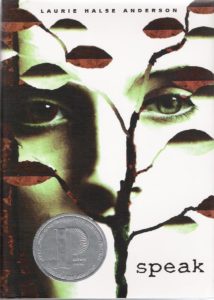Remember last September, when the book banners crawled out of their pits of nastiness to try to remove YA literature from classrooms and libraries?
It is September again, my friends.
Wesley Scroggins is an associate professor of management at Missouri State University. He was also a speaker at Reclaiming Missouri for Christ, a recent seminar whose purpose was to “To educate our pastors, legislators, educators, students, and all citizens as to the truth about America’s Christian Heritage and the role of fundamental, Biblical Christianity in the establishment and function of our legal, legislative, and educational system, and to work towards the successful reestablishment of these values in our society.”
(Note: I love Jesus. My dad is a United Methodist minister. I point out Scroggins’ affiliation with this group so readers can understand his larger agenda.)
The fact that he sees rape as sexually exciting (pornographic) is disturbing, if not horrifying. It gets worse, if that’s possible, when he goes on to completely mischaracterize the book.
Some people say that I shouldn’t make a big deal about this. That I am giving him more attention than he deserves. But this guy lives about an hour and half from the school district that banned Sherman Alexie’s THE ABSOLUTELY TRUE DIARY OF A PART-TIME INDIAN this month.
My fear is that good-hearted people in Scroggins’ community will read his piece and believe what he says. And then they will complain to the school board. And then the book will be pulled and then all those kids who might have found truth and support in the book will be denied that. In addition, all the kids who have healthy emotional lives but who hate reading, will miss the chance to enjoy a book that might change their opinion.
All because some wingnut grabbed the opinion page of his newspaper, bellowed his lies, and no one challenged him.
I have already received incredible support on Facebook and in my inbox. Paul Hankins, an English teacher from Indiana, has started a Twitterfeed – #SpeakLoudly – where people can tweet their opinions. And my hero, Judy Blume, wrote to say she is bringing this nonsense to the attention of the National Council Against Censorship.
(I must confess – receiving a message from Judy Blume made me shriek a little. I am such a fangrrl of hers.)
I love the support from the blogosphere, but am concerned that the people in Scroggins’ community who might be swayed by his nonsense are not reading those blogs or following Twitter feeds on the topic. So I am writing to the school district superintendent and to the newspaper. But I know (because I’ve been here before) that my comments will likely be greeted with scepticism because I have a vested interest in the process.
I need your help.
Please share your experiences with SPEAK; your own response to the book, or the way you’ve seen it work in a school setting. Tahleen has already posted her thoughts on her blog. You can do the same. Please share links to your blog in Comments.
But then, please speak up to the people who can make a real difference in Republic, MO.
You can submit a letter to the editor of the News-Leader.
You can write to the superintendent of the Republic School District, Dr. Vern Minor, or to the high school principal, Daren Harris.
You can comment directly to Scroggins’ opinion piece.
Here I am reading “Listen” the poem I wrote based on reader response to SPEAK.
Banned Books Week is only a few days away. Consider this your chance to get a head start on speaking up about a good book and defending the intellectual freedoms guaranteed us in our Constitution.






